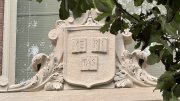This week Harvard announced another administrative restructuring, amid continued speculation about the status of settlement negotiations with the Trump administration. Meanwhile, the federal government lobbed new accusations about the University’s connections to China and a new executive order demanded sweeping changes to federal grantmaking.
On Monday, the University announced a plan to merge its gender equity and nondiscrimination offices, creating an umbrella entity to oversee Title IX and Title VI compliance. The new Office for Community Support, Non-Discrimination, Rights and Responsibilities (CSNDR) will handle complaints and investigations related to sexual misconduct, bullying, and discrimination (including antisemitism), although Harvard said that the reorganization does not alter its policies related to those issues. Nicole Merhill, the University’s Title IX coordinator and former director of the Office for Gender Equity, will lead the new entity.
In a letter to the campus community, Merhill, an attorney who joined Harvard after 15 years with the U.S. Department of Education’s Office for Civil Rights, said that CSNDR would allow for greater efficiency and that all formerly available resources remain in place.
The new office is made up of three specialized teams:
- the SHARE Team (Sexual Harassment/Assault Resources and Education), offering confidential, survivor-centered support to individuals and communities;
- the Prevention Team, with education and outreach initiatives focused on harm reduction, structural improvements, and culture change;
- the NDAB (Non-Discrimination and Anti-Bullying) and Title IX Compliance Team, which serves as an “expanded central hub” for information on University policies and helps Harvard community members file formal complaints, seek informal resolutions, and get access to resources both inside and outside the University.
Over the summer, Harvard added new staff roles to the NDAB and Title IX Compliance Team, including a Title VI coordinator and deputy for compliance; a deputy for Title VI and Title IX compliance; and a deputy Title VI coordinator and case manager, who will consult on complaints of antisemitism and other forms of discrimination.
These changes come at a time when the University is under intense scrutiny for its handling of civil rights complaints, particularly those involving antisemitism. Title VI of the Civil Rights Act of 1964 prohibits discrimination on the basis of race, color, and national origin in programs that receive federal funding. The government has argued in court that Harvard’s handling of antisemitism on campus is a legitimate basis for cutting billions in federal research funding.
As part of the reorganization, Harvard also launched a new, required e-learning module for Harvard students, faculty, staff, and postdoctoral fellows, on the University’s sexual misconduct and nondiscrimination policies. In her letter, Merhill noted that the module “also reiterates that in assessing claims of antisemitism, the University, like the U.S. Department of Education, uses the working definition of antisemitism endorsed by the International Holocaust Remembrance Alliance (IHRA definition).” The University agreed to adopt the much-debated IHRA definition in January, as part of a settlement of two antisemitism lawsuits. “Recognizing and combating discrimination on the basis of shared ancestry, including antisemitism and Islamophobia,” Merhill wrote, “is essential to creating and nurturing a community where everyone can thrive.”
On the day of the reorganization announcement, the Crimson reported that President Alan M. Garber had denied that the University was considering a rumored $500 million settlement with the Trump administration. Garber had told faculty members that “the University is seriously considering resolving its dispute with the White House through the courts rather than a negotiated settlement,” the Crimson wrote, citing three unnamed faculty sources. On Tuesday, citing an anonymous White House source, The Boston Globe reported that talks between Harvard and the Trump administration were “intensifying” and had reached a point “where the administration is looking over proposed text that could lead to a deal.” A Harvard spokesperson declined to comment on either article.
On the heels of those seesawing news reports, Trump signed a memorandum on Thursday, demanding that universities turn over more admissions data to the government. As part of its anti-DEI crusade, his administration has accused Harvard and other universities of illegally using race in its admissions policies. (The U.S. Supreme Court barred affirmative action in college admissions in a 2023 ruling.) In their recent settlements with the Trump administration, Columbia and Brown both agreed to hand over significant amounts of data, including applicants’ grades and test scores and information about their racial backgrounds—not data universities typically share with the government. In Harvard’s negotiations with the White House, the question of admissions data sharing has become a closely watched point of contention.
Also on Thursday, Trump issued an executive order claiming the power to put all federal research grants under political control. The order directs that any new grant announcement be reviewed by a federal agency head or designated senior appointee, and that agencies “streamline” grant requirements in order to “to permit termination for convenience, including when the award no longer advances agency priorities or the national interest.” Agency heads were instructed to formalize the ability to terminate any previously awarded grants. “In short,” wrote Ars Technica in its summary of the order, “the new rules would mean that all federal science research would need to be approved by a political appointee who may have no expertise in the relevant areas, and the research can be canceled at any time if the political winds change. It would mark the end of a system that has enabled US scientific leadership for roughly 70 years.”
It is important to note that the powers the Trump administration are asserting go beyond what is permitted in the Constitution, which gives Congress the power to approve federal funding. On Tuesday, the Government Accountability Office issued a caustic report finding that the Trump administration had broken the law earlier this year by terminating over 1,800 National Institutes of Health grants that had been congressionally approved.
Meanwhile, government lawyers said in a court filing on Wednesday that they would no longer use a May 22 letter banning international students from Harvard. The letter, sent by U.S. Department of Homeland Security Secretary Kristi Noem, purported to revoke Harvard’s certification in the Student and Exchange Visitor Program (SEVP), which allows universities to host foreign students. The letter prompted a lawsuit from Harvard and was blocked by a U.S. District Court judge, who granted a temporary injunction in June. In this week’s two-page filing, the government offered to “simplify the case and narrow the issues in dispute” and indicated that the Trump administration is “open to counterproposals and a meet and confer” with Harvard, which it said the University declined.
Separately, three Republican lawmakers accused the Harvard Kennedy School (HKS) of having “close” ties to the Chinese Communist Party (CCP). In a July 30 letter addressed to Garber, Congressman John Moolenaar, chair of the House Select Committee on the CCP, demanded the University hand over any documents from January 2015 to the present connecting Harvard to the CCP, as well as records of any money or benefits received from the CCP. The letter gave a deadline of August 7. (A Harvard spokesman did not respond to a request for comment before the deadline.)
The letter was also signed by Representative Tim Walberg, the House Committee on Education and the Workforce chair, and Representative Elise M. Stefanik ’06, the House Republican Conference chair. It follows a previous letter that alleged numerous improper ties between Harvard and China—a frequent line of attack by the Trump administration—and included a demand for documents. The House Select Committee on the CCP launched an investigation into Harvard in May. (In recent reports, The New York Times and The Wall Street Journal noted how Harvard’s connections over the years with Chinese institutions have left it open to attack.)
This week’s letter, citing “multiple whistleblowers,” alleged that HKS maintains a “formal partnership” with the Chinese Executive Leadership Academy Pudong (CELAP), an institution controlled by the CCP. “Under that partnership,” the letter claims, “the rising CCP elite who are being prepared for senior Communist Party leadership positions participate in training at Harvard in the United States.”
While the flurry of allegations out of Washington, D.C., was satirized in The Boston Globe this week, the University’s response to the onslaught of federal accusations has been deadly serious—and closely watched—because Harvard’s actions may set a precedent for how U.S institutions of higher education respond to the Trump administration’s demands.









